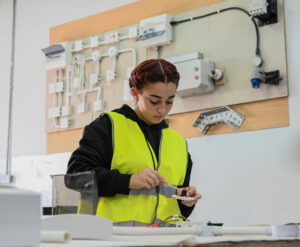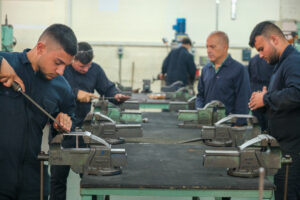Nowadays, it might not be trendy to encourage young learners to embark on a trade. However, when you call a plumber at home and your system is fixed, you are ready to pay anything. Similarly, when you service your car you are always ready to pay good money for professional work. The same holds for any qualified or unqualified technician or tradesman that services any of your appliances, your electricity system, the membrane on your roof or who is called for plastering, tile laying, painting or any other so-called manual work. You pay for a professional job well done. Manual work is today a well-paid job. Talent in trade is in demand but the supply is low. In fact, when you discover such talented persons or SMEs, you keep their contact numbers and you share it with family and close friends.

It is truly a pity that in our country (but the trend is also in most southern European countries) the prestige and social status talented people in trades possess has almost been lost. In other countries where trades and crafts kept their social status high, almost any job carries dignity and respect.
Further, employers who actively participate in MCAST Encounters with Industry lament that they find it hard to find talented persons in many sectors whom they can employ. Better qualified there are two schools of thought behind such a repeated assertion. The first is that employers with foresight and long-term strategies prefer to invest in local talent and pay adequate salaries than in foreign human capital. Many other employers, it seems, prefer lower salaries, more head counts and short to medium term economic gains.

Why is education not attracting young talent to trades in an age of technology? Why is it trendy to classify crafts as hobbies and yet there is so much talent in our population in all aspects of the arts that could lead to careers?
MCAST is continuously seeking to regain lost ground in in the education and training in trades. In addition, the introduction of vocational subjects in compulsory education is making trades more accessible and visible to younger generations.
But, it seems, that this is not enough. Some trades today need reinventing.

Technology has made it easier to do anything that can later be defined as artistic, service oriented and problem solving. For instance, 3D printing sculpturing statutes is beyond anyone’s imagination. In any of the trades, the use of technology makes it easier to plan, to work and to deliver high standard services or production. When you look at welders, carpenters, tile layers, technicians in the maintenance sectors and so many other manual workers you cannot help but admire their combined mental and manual skills at once. Technology has truly penetrated in all aspects of trades. This is of benefit for those who possess basic skills and are familiar with artificial intelligence.
However, the aptitude towards the trade or craft must be nurtured in a planned systematic manner. First fertile ground must be the possession of basic skills namely reading and writing in the mother tongue and English, workable knowledge of Mathematics, IT and citizenship.
The second skills-set consists of soft skills – a person capable of communicating in a polite and understandable manner, able to work in an organized way autonomously and with responsibility, showing a professional style of working and learning. Learning-to-learn is today’s mantra in ones control of quality of life. The third set of skills relate to the particular talent that persons learn to acquire through theory and practice.

The combination of the three sets of skills/competences is what makes todays and the future tradesman in an age of technology. Any missing element will jeopardize the concealed talent in any particular trade or craft.
If our education system moves along these three directions then we would certainly be on the right track to reinvent trades, to recover the lost dignity and prestige of manual jobs, attract more young people to trades and crafts and sustain our fast growing and changing economic and social backbone.
MCAST is moving in the direction of restoring status, prestige and dignity to learners inclined to forge a career in the trades and crafts. The College cannot work in isolation. It requires several former stakeholders to assume roles of shareholders. We need government to continue backing the idea of reinventing trades with new jobs in the so-called dying trades (over 74!) an infrastructure that attracts, is effective and efficient in today technological world and with adequate human resources to support a new culture of trades and crafts. We also need employers to invest in promoting trades. Pledging more apprenticeship programmes, more on-the-job training, work experience and direct financial support to entice students to manual jobs is the way forward.

Finally, we need the media to support this crucial reinvention by promoting talent in all its forms – celebrating achievements in producing artefacts, in finishing buildings with all amenities, in managing daily necessities and in servicing our population with care, technical know-how and hard manual work. We also require support from policy-makers and politicians to celebrate the work of hundreds of lecturing, management and administrative staff at MCAST. Pushing agendas to tarnish the image of vocational education and training in Malta is shooting ourselves in the foot.
Trades are talent that we cannot afford to lose. MCAST will be embarking on a series of initiatives to regenerate the love for trades and craft. With over one fourth of those sitting for SEC not attaining the standard, it is high time that we rekindle in this large cohort the drive, the passion and the attractive financial returns of trades and craft in our country. More shareholders (not just stakeholders) must join MCAST to accomplish this goal. The quicker we act, the faster we can all reinvent ourselves and enjoy return on investment.
Author: MCAST Principal & CEO Professor Joachim James Calleja







 MCAST Main Campus
MCAST Main Campus  +356 2398 7100
+356 2398 7100
 information@mcast.edu.mt
information@mcast.edu.mt